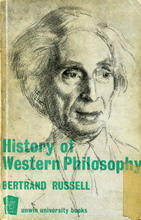
History of Western Philosophy
And its Connection with Political and Social Circumstances from the Earliest Times to the Present Day
Russell, Bertrand
Publisher: Unwin University Books, London, United Kingdom
Year First Published: 1946
Year Published: 1961
Pages: 842pp Resource Type: Book
A history of western philosophy in relation to its social and economic background.
Abstract:
-
Table of Contents
Preface
Introduction
BOOK I: Ancient Philosophy
Part I: The Pre-Socratics
1. The Rise of Greek Civilization
2. The Milesian School
3. Pythagoras
4. Heraclitus
5. Parmenides
6. Empedocles
7. Athens in Relation to Culture
8. Anaxagoras
9. The Atomists
10. Protagoras
Part II: Socrates, Plato, and Aristotle
11. Socrates
12. The Influence of Sparta
13. The Sources of Plato's Opinions
14. Plato's Utopia
15. The Theory of Ideas
16. Plato's Theory of Immortality
17. Plato's Cosmogony
18. Knowledge and Perception in Plato
19. Aristotle's Metaphysics
20. Aristotle's Ethics
21. Aristotle's Politics
22. Aristotle's Logic
23. Aristotle's Physics
24. Early Greek Mathematics and Astronomy
Part III: Ancient Philosophy after Aristotle
25. The Hellenistic World
26. Cynics and Sceptics
27. The Epicureans
28. Stoicism
29. The Roman Empire in Relation to Culture
30. Plotinus
BOOK II: Catholic Philosophy
Introduction
Part I: The Fathers
1. The Religious Development of the Jews
2. Christianity During the First Four Centuries
3. Three Doctors of the Church
4. St Augustine's Philosophy and Theology
5. The Fifth and Sixth Centuries
6. St Benedict and Gregory the Great
Part II: The Schoolmen
7. The Papacy in the Dark Ages
8. John the Scot
9. Ecclesiastical Reform in the Eleventh Century
10. Mohammedan Culture and Philosophy
11. The Twelfth Century
12. The Thirteenth Century
13. St Thomas Aquinas
14. Franciscan Schoolmen
15. The Eclipse of the Papacy
BOOK III: Modern Philosophy
Part I: From the Renaissance to Hume
1. General Characteristics
2. The Italian Renaissance
3. Machiavelli
4. Erasmus and More
5. The Reformation and Counter-Reformation
6. The Rise of Science
7. Francis Bacon
8. Hobbes's Leviathon
9. Descartes
10. Spinoza
11. Leibniz
12. Philosophical Liberalism
13. Locke's Theory of Knowledge
14. Locke's Political Philosophy
15. Locke's Influence
16. Berkeley
17. Hume
Part II: From Rousseau to the Present Day
18. The Romantic Movement
19. Rousseau
20. Kant
21. Currents of Thought in the Nineteenth Century
22. Hegel
23. Byron
24. Schopenhauer
25. Nietzsche
26. The Utilitarians
27. Karl Marx
28. Bergson
29. William James
30. John Dewey
31. The Philosophy of Logical Analysis
Index
Subject Headings


